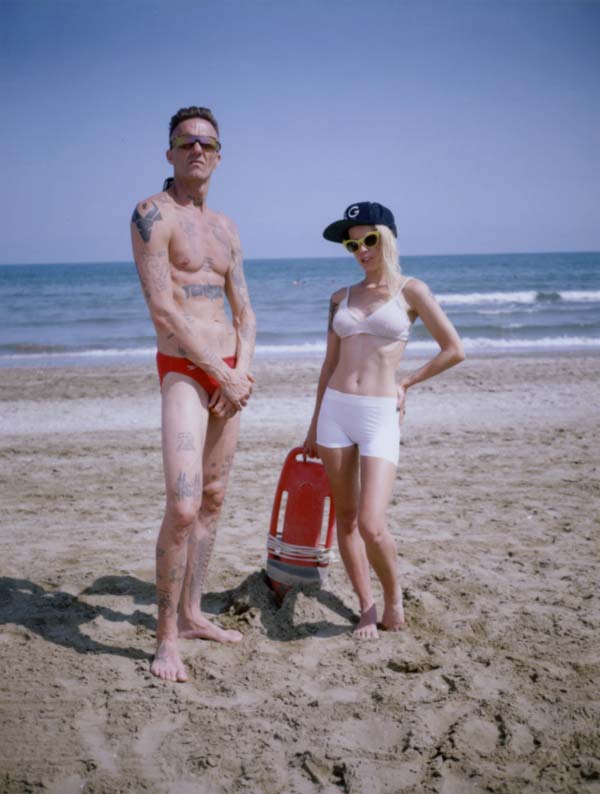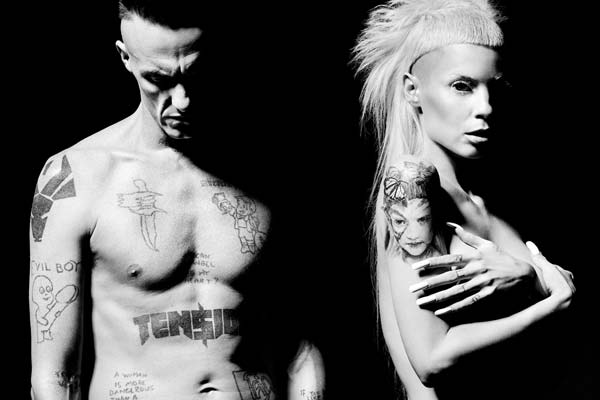South African rave-rap group, Die Antwoord, have had a steady rise to recognition, shocking the world at large with their brash combination of tribal-inspired rave beats, venomous lyrics and a visual style drawn from a pastiche countercultural movement known as ‘zef’.
Formed in Cape Town in 2008, Die Antwoord (Afrikaans for ‘The Answer’) is comprised of rappers Ninja and Yo-Landi Vi$$er as well as DJ Hi-Tek. They garnered worldwide-web attention in 2009 when they released their debut album, ‘$O$’, online for free; in 2010 their video for ‘Enter The Ninja’ went viral.
Since then the internet rumour mill has been in overdrive with furious exchanges on forums and long tirades on article-comment threads debating the veracity of Die Antwoord. For many it comes down to: ‘If they’re ‘The Answer’, what the hell is the question?’ “People are unconscious, and you have to use your art as a shock machine to wake them up,” Ninja told Spin magazine.
“Some people are too far gone. They'll just keep asking, ‘Is it real? Is it real?’ That's dwanky. That's a word we have in South Africa, ‘dwanky’. It's like lame. ‘Is it real?’ You have to be futuristic and carry on. You gotta be a good guide to help people get away from dull experience.”
This ethos of providing a shock awakening to the world is at the heart of not only Die Antwoord’s work, but also that of Ninja aka Watkin ‘Waddy’ Tudor Jones. Jones is a mixed-media artist well-known, if not infamous, in his homeland for producing multimedia projects that are often tongue-in-cheek parodical examinations of the realities of everyday life in South Africa, a nation still coming to terms with centuries of racial oppression and class struggle.
In an interview with brightestyoungthings.com in September, Ninja spoke of receiving a machine gun (sans the ammo clip) as a Christmas present from Yo-Landi because: “South Africa is pretty fucking freak mode, and sometimes you just need a machine gun. Not like you’re going to go and do something bad, but if something bad comes to you, then they’ve made a mistake … the crime rate [in South Africa] is like the most retarded crime rate in the world. It’s just recently dropped down, and everyone’s a bit happier, but it’s dropped down to only like 40 murders a day. Like every single day.”
“Our shit is hostile-takeover shit. What the fuck are you going to do about it? Nothing!”
As for ‘zef’, Ninja’s partner-in-rhyme, Yo-Landi gave The Observer a fairly succinct summary of the movement. “It's associated with people who soup their cars up and rock gold and shit. Zef is, you're poor but you're fancy. You're poor but you're sexy, you've got style.”
The integrity of Yo-Landi’s interpretation, as well as the way in which she and Ninja represent the ‘zef’ movement has come under scrutiny as a popularised bastardisation of rural (read ‘poor’) Afrikaans culture.
According to ‘The Dummies Guide To Zef’, the term has its roots in 1960s Johannesburg as derogatory slang for middle-class white people, ‘zef’ being a reference to the Ford Zephyr motorcar popular among the middle class. Others condemn it as ‘white trash’ trying to raise their social station by accepting and exploiting tribal culture.
In a 2012 New York Times article, journalist Eve Fairbanks wrote: “South African critics were agitated that Die Antwoord appropriated the distinctive gangster style of the ‘coloreds’, South Africans of mixed racial origins. How dare a white band hit the jackpot by imitating a community whose own musicians were still largely stuck in apartheid-created slums? One pundit pronounced Die Antwoord ‘basically blackface’.”
Wherever they go and whatever they do, controversy and insistent questioning seem to haunt both Ninja and Yo-Landi. In an interview with Norwegian TV back in 2010, both artists took exception to the interviewer asking whether they were ‘conceptual artists’, and recently Ninja came under fire for poor behaviour and stagecraft on the set of ‘Chappie’, the latest cinematic offering from South African ‘District 9’ director, Neill Blomkamp. In February, City Press reported allegations from cast and crew ranging from Ninja berating fellow actors on their performances, to sending explicit photographs of him performing an act of self-fellatio.
However, all this is brouhaha over Die Antwoord is well-traversed terrain for the group, as well as their supporters and detractors; while debates rage on about realness, artistic merit and all that ‘dwank’ (thanks Ninja, it’s been added to the lexicon), general consensus seems to be, ‘Yeah, they’re weird but so what?’
All arguments and semantics aside, Die Antwoord are artists who use shock to impart their message, not at all unlike the steady stream of shock-rockers who have employed the aesthetic of the grotesque and subversive content, from Screamin’ Jay Hawkins and Arthur Brown to KISS, GWAR and Marilyn Manson.
Following the unprecedented success of their initial releases and the public interest they stirred, Interscope Records signed Die Antwoord to produce their second studio album, ‘Ten$ion’. Following a falling out over the single ‘Fok Julle Naaiers’, Interscope and Die Antwoord parted ways around 2011/ 12 and the group set up Zef Records to self-produce their own work without corporate interference from a label. “Leaving Interscope was not a personal thing,” Yo-Landi explained to Spin.
“These record companies are a certain kind of machine and we weren't able to function in it. You think you sign with a major label and it's gonna be bumpin'. Like, ‘Fuck. It's gonna be on!’ Then the truth is they move like a slow turtle. The only thing they really want is to make more of what's already popular. We thought they'd let us do what we wanted, but they kept pushing us to be more generic.”
“[Interscope] have this term: ‘Reach out’,” Ninja added, “We needed to ‘reach out’. What do you say to that? The worst, most horriblest [sic] thing you could say to me is that Die Antwoord has to ‘reach out’. You have to do the opposite: you have to be the magnet that pulls people in.”

Die Antwoord released their third, studio album, ‘Donker Mag’, through Zef earlier this year to yet more mixed reactions of rave reviews, mild amusement and bewildered head-scratching their unique form of creative expression seems to foster.
Being true multimedia experimentalists, Ninja and Yo-Landi are reportedly working on a line of Die Antwoord action figures based on themselves and the character of ‘Evil Boy’. “We wanted to make a mascot first, so we made Evil Boy,” Ninja told Brightest Young things. “The Good Smile Company, they make all these different kinds of toys, they’re like the Lamborghini of toy companies in Japan.”
To all the doubters and high-brow critics of Die Antwoord and whatever message they’re trying to get across, Ninja had this well-considered response to offer: "Fuck the no-game-having intellectuals out there," he said to Rolling Stone’s Diane Coetzer. "Our style is straight up Malema versus Zuma... We appeal to the man in the street. We run the exact same campaign as Zuma and Malema do. We make pop music. We don't make intellectual music. Our shit is hostile-takeover shit. What the fuck you [sic] going to do about it? Nothing!"
Die Antwoord At Future Music Festival
Sat 28 Feb - Royal Randwick Racecourse (Sydney)Sun 1 Mar - Arena Joondalup (Perth)
Sat 7 Mar - Brisbane Showgrounds
Sun 8 Mar - Flemington Racecourse (Melbourne)
Mon 9 Mar - Adelaide Showground

